
8 minute read
SOLUTIONS FOR SUSTAINABLE COASTAL & MARINE DEVELOPMENT
SOLUTIONS FOR SUSTAINABLE COASTAL & MARINE DEVELOPMENT
FEATURE DANA LIPARTS PHOTOGRAPHY THE OCEAN CLEANUP
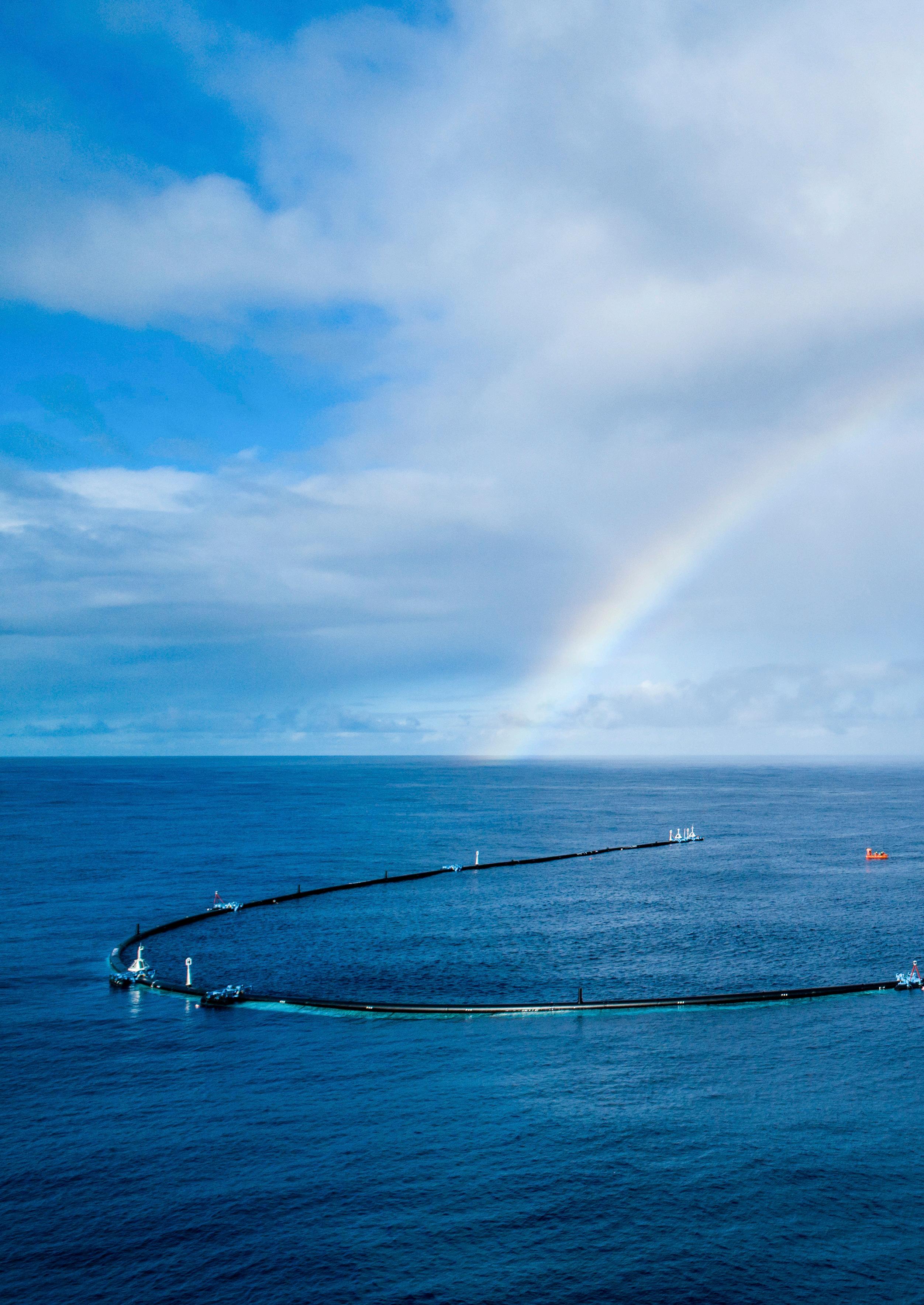
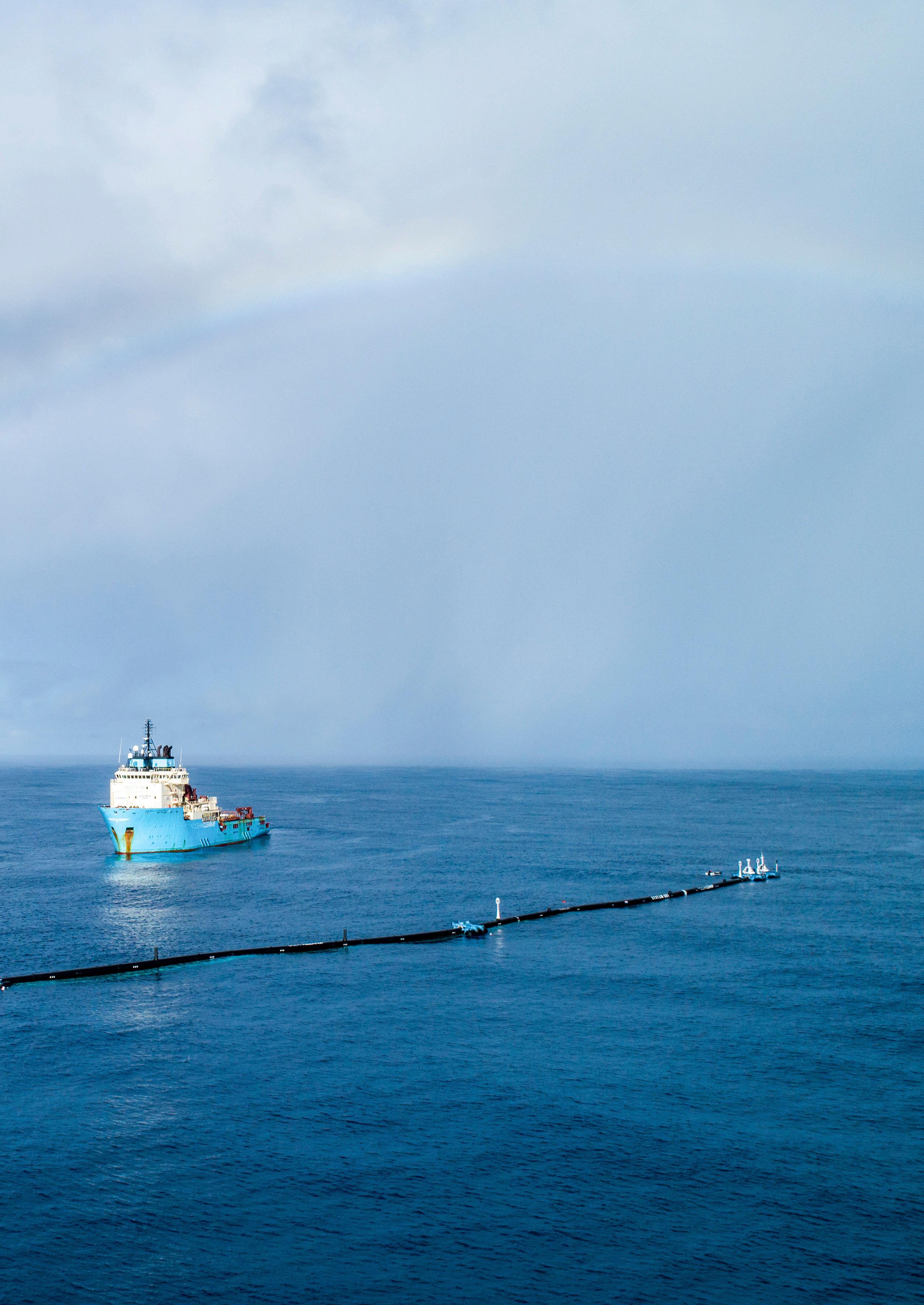
What is your method in cleaning up oceans and why is it so effective? Cleaning up our marine environment is a multifaceted and complex issue that needs to be approached from a number of angles. Marine pollution is not just caused by plastic, but from a range of activities as a result of development works, such as construction and industrial activities.
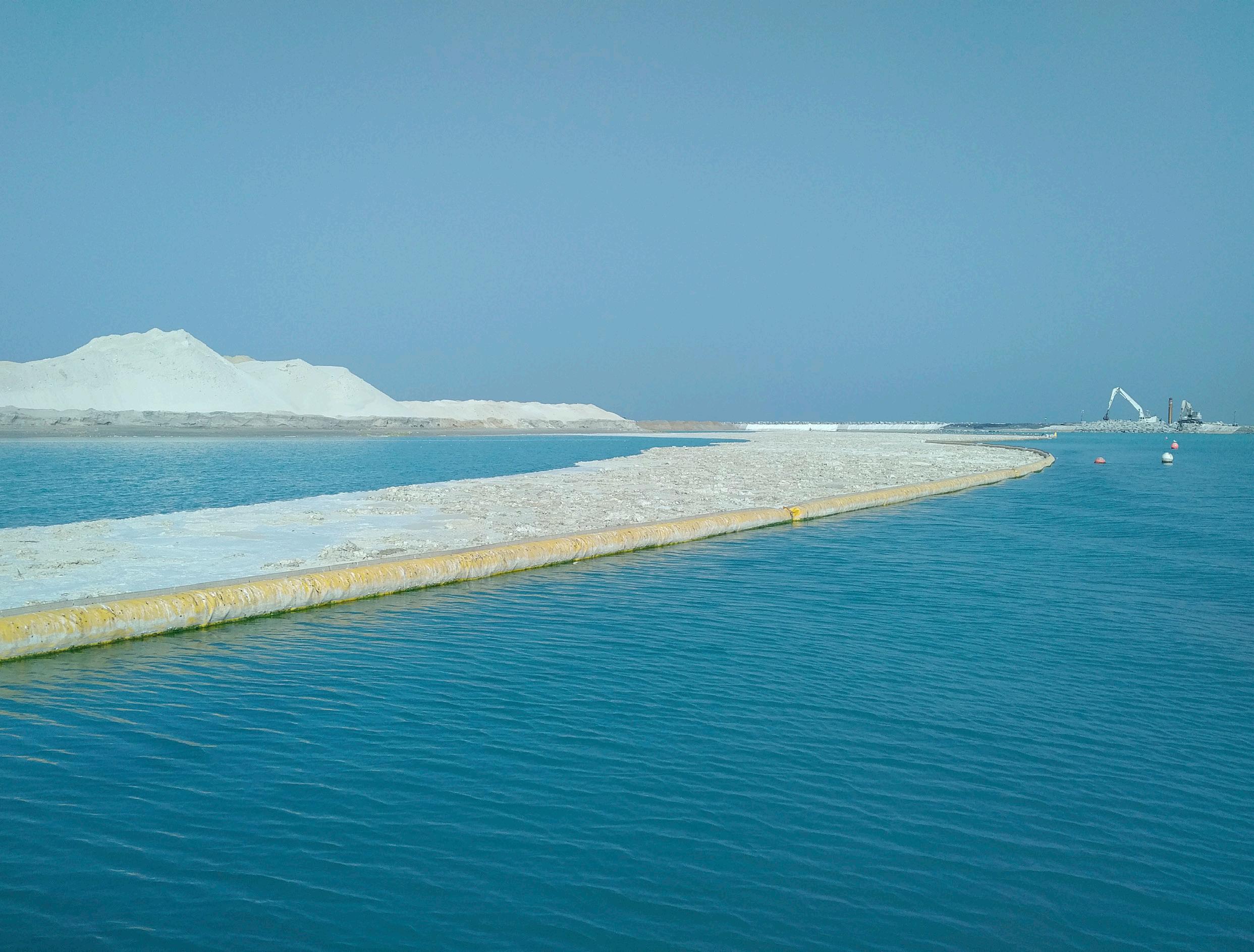
Ecobarrier Silt Curtains, Type III.
At Ecocoast, we consider the entire lifecycle of any marine or coastal development, from development and infrastructure through to operation and maintenance. At every stage, there is significantriskofdetrimentallyimpacting our marine environment. Our business is based on offering sustainable solutions to protect and support the marine environment and coastline at every stage of the lifecycle of a marine or coastal development.
We are pragmatic enough to accept that the world will continue to build and live on our coastlines. Over 40% of the world’s population lives on coastlines, and this number is growing exponentially. We have increased our coastline by over 7% in the past decade. Again, this number is growing exponentially. The Ocean Economy is predicted to be worth over $3 trillion by 2030 and 71% of the earth’s surface is covered by oceans.
At Ecocoast, our goal is to make it easy to build, live and operate sustainably on our coastline and marine environments. The key word is “sustainably”. We do this by offering a portfolio of pioneering solutions for sustainable coastal and marine developments, to reduce the impact from coastal and marine activities, construction, land reclamation works, infrastructure operations and other activities.
We have been committed to this journey for over a decade. In 2009 when we established Ecocoast, “sustainability” was not the buzzword it is today. We spent the majority of our time convincing clients of the importance of sustainable development. Thankfully today that has changed. We are seeing major projects, such as the Red Sea and Al Jubail developments leading with sustainability as a priority. This has freed up our time to focus on developing the next generation of pioneering solutions for sustainable coastal and marine development. We see this as our duty – to be at the forefront of pioneering marinetech solutions to make it easy for everyone to build and operate sustainably.
Critical to this is ensuring our solutions offer a double bottom line; that is, they are not just good for the environment, but they also offer commercial value. We are obsessive about this. We do not assume a sustainable solution will be chosen over a traditional solution just because it is good for the environment. Particularly in this market, there needs to be more. We always ensure we offer another type of value – generally in the form of a costsaving or revenue generation. Therefore by taking on our solutions, they are not just doing good for the environment but they are also doing good for the client’s business.
Silt curtains, containment booms and sandfilled geosynthetic containers are just a few examples of product solutions that offer protection to the marine environment against particular types of impacts resulting from development projects.
We were a pioneer in designing and manufacturing the strongest silt curtains in the world, under the brand Ecobarrier, which saves clients up to USD150,000 per day in downtime, and can be recycled and reused instead of winding up in a landfill after single use.
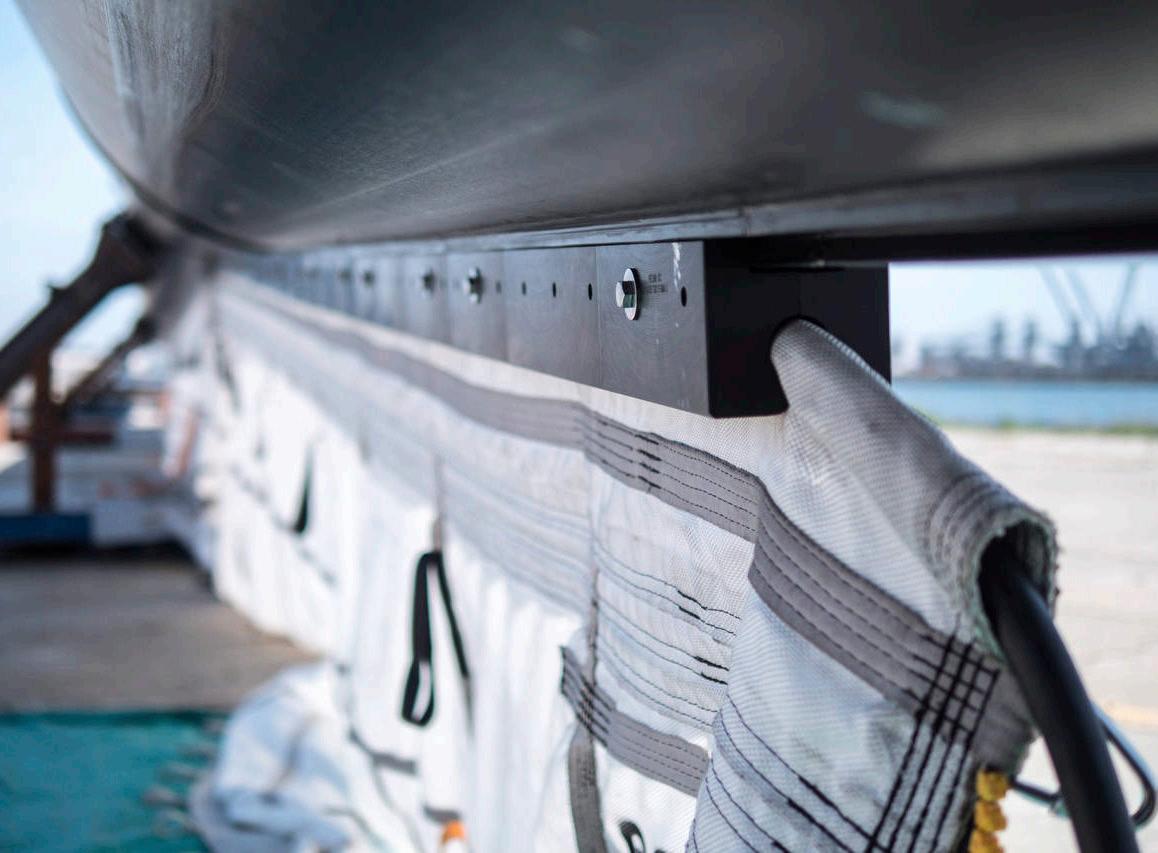
Courtesy of The Ocean Cleanup – Ecocoast Screen.
Silt curtains are used to protect the marine environment during marine construction and coastal reclamation works. In Dubai alone, the coastline has grown by over 6% since 2009 because of dredging and reclamation, making the use of marine protection barriers a very important part of protecting our oceans.
What was your involvement with The Ocean Cleanup? Our work with The Ocean Cleanup tackles the issue of ridding the world’s oceans of plastic. At the end of 2017, we partnered with The Ocean Cleanup to design and manufacture the screen for its marine barrier – System 001 –to clean up the Great Pacific Garbage Patch (GPGP).
The GPGP is an area in the Pacific Ocean, located between San Francisco and Hawaii, where currents converge and collect floating debris, mainly different types of plastic.
The marine barrier is a complex engineered design consisting of a 600-metre-long floating element made of High-Density Polyethylene (HDPE), to which a screen is attached that reaches 3 metres down underwater.
The screen, designed and manufactured by Ecocoast, is made from a tightly constructed, geotextile-inspired material to withstand the harsh conditions in the Pacific Ocean. It passed all rigorous tests in the North Sea to determine final design parameters, measure loads and monitor underwater behaviour. A series of tests also took place in the United States, aimed at investigating the screen’s behaviour under tow to the GPGP.
The screen for System 001 was shipped in July 2018 from our production facility in Umm Al Quwain to San Francisco, to be on time for the launch of the world’s first ocean cleanup system.
We can proudly say that we were the first to develop a successful screen. Our R&D and Engineering expertise informed the development of this groundbreaking screen. The world’s first ocean cleanup system was launched on September 8, 2018.

Courtesy of The Ocean Cleanup –System 001 Launch.
GPGP stats from a study released by The Ocean Cleanup in 2018:
• Holds ocean plastic concentrations between 10s to 100s kg/km2.
• Measures 1.6 million km2 – 3 times the size of France.
• Contains 80 million kg of floating plastic, equivalent to 500 jumbo jets (about 1.8 trillion pieces).
Tell us some more about the new mooring technology you developed to protect the marine environment. Earlier this year, we launched Ecomoor, a pioneering, environmentally-friendly mooring system. Thousands of traditional moorings are installed along the UAE’s coastline alone. Historically, blocks and chains have mostly been used to secure marine buoys. While this traditional method gets the job done, it also presents several drawbacks that can lead to increased costs, more frequent maintenance and affect the surrounding environment.
Traditional chain mooring systems act as a weight on the seabed. The chains move on the seabed when the marine buoys pull and shift due to tidal and/or wind and wave action situations, resulting in destruction of bottom vegetation. The disturbance to the seabed can suspend sediment and increase turbidity, diminishing the level of sunlight and light attenuation critically important to seagrass growth and survival.
Ecomoor is the next-generation of mooring systems; importantly, offering protection to sensitive seabed environments. It promotes low maintenance, reduced manpower resources and sustainability. Because of the neutral buoyancy of the multi-layer mooring line, Ecomoor is always in a floating state and does not drag on the seabed, offering full protection to sensitive marine environments, such as seagrass meadows and coral reefs.

Courtesy of The Ocean Cleanup – System 001 Mission First Plastic.
Ecomoor can be used for different applications, from navigation buoys and deep moorings, to floating solarstructures and aquaculture parks.
More and more marinas, ports, cities and countries around the world are looking for new solutions that address these issues, prohibiting chain moorings and requiring more environmentally-friendly moorings to help preserve our natural environment.
Why are such methods needed in today’s world? How alarming is the current situation? As the world’s population is expanding every year (from 1.65 to 6 billion during the 20th century alone), so does the amount of garbage that people generate. Several studies have proven that the vast majority of garbage is plastic.
According to National Geographic, a trillion plastic bags are used worldwide each year, and they have an average working life of just 15 minutes. It is estimated that 1.15 to 2.41 million tons of plastic are entering the ocean each year from rivers (source: The Ocean Cleanup).
In a time where pollution has become a big issue, sea levels are rising, coastlines are increasing and ports are expanding due to increasing seaborne trade, the industry needs pioneers with innovative, alternative solutions to provide a balance between coastal development and environmental protection.
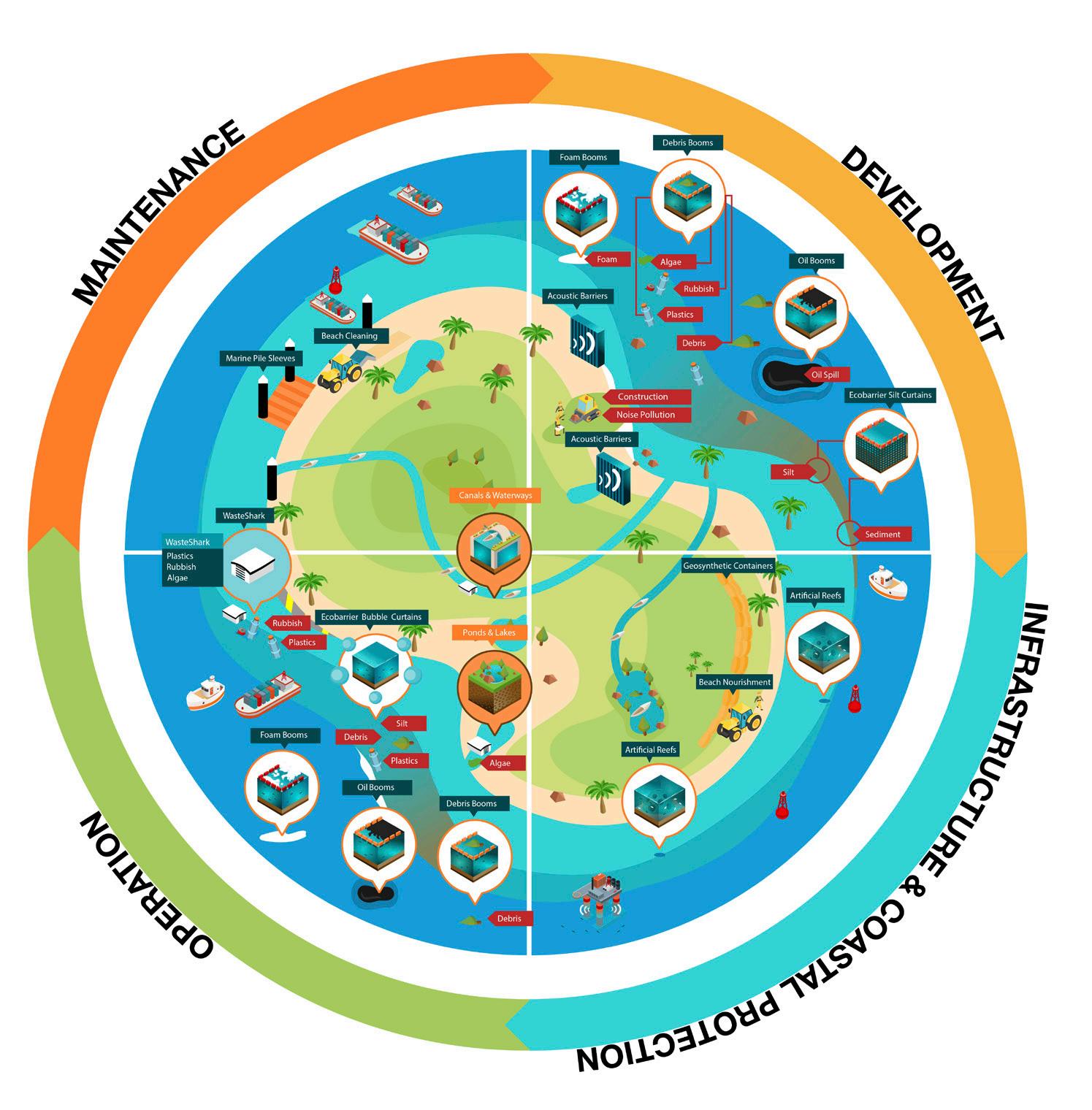
Ecocoast’s Coastal & Marine Development Cycle.
Ecocoast is committed to solving the world’s most pressing marine problems and creating a more pioneering marine industry through developing pioneering solutions for a better marine environment. We have dedicated ourselves to this mission for the past 10 years, and will continue to lead an innovation culture by continuously setting new standards in marine solutions.
ABOUT ECOCOAST: Ecocoast is the global leader in pioneering solutions for sustainable coastal and marine development. Its core purpose is to pioneer. Everything the business does is either the first to market or an evolution of an existing idea.
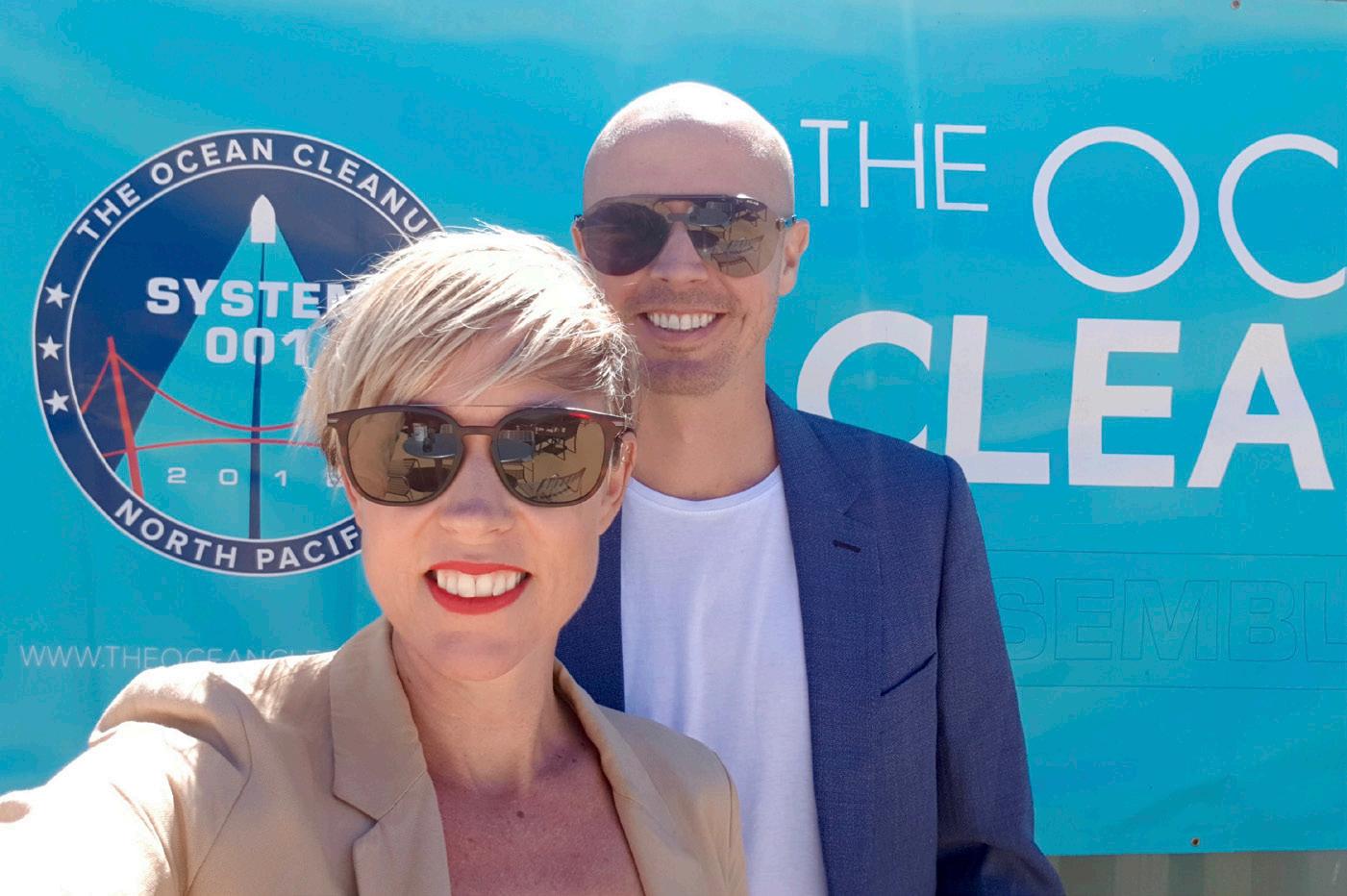
Ecocoast Founders, Dana Liparts and Lachlan Jackson at The Ocean Cleanup Launch.
The business is built around offering products and services at every stage of the coastal and marine development lifecycle, from development, infrastructure and coastal protection, to operation and maintenance, focusing on sustainable solutions to protect and support our coastline and marine environment.
Through its brand Ecobarrier, the business is at the forefront of designing, manufacturing and distributing globally a range of marine products for coastal and marine protection, demarcation, navigation and pollution management. Early 2019, Ecocoast launched Ecomoor – the next-generation mooring system, designed and manufactured in the United Arab Emirates, and Hyperion – a range of self-contained solar LED marine lanterns for demarcation purposes.
Ecocoast works with clients across the Middle East, Africa, Europe, Asia and the Americas in the commercial and government sectors, primarily general and marine contractors; developers; hotel, port and marina operators; facility managers and governments.
Through developing pioneering solutions for a better marine environment, the business will achieve its mission of solving the world’s most pressing marine problems and creating a more pioneering marine industry.
For more information, log on to: www.ecocoast.com or email us at info@ecocoast.com
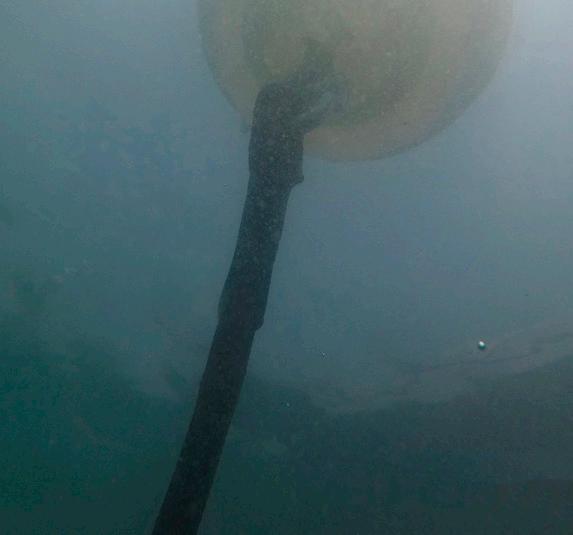
Ecomoor, the Next Generation Mooring System.










